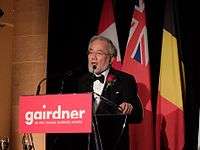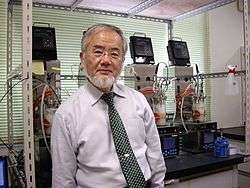Yoshinori Ohsumi
| Yoshinori Ohsumi | |
|---|---|
|
Yoshinori Ohsumi | |
| Born |
February 9, 1945 Fukuoka, Japan |
| Nationality | Japanese |
| Fields | Cell biologist |
| Institutions | Tokyo Institute of Technology |
| Alma mater | University of Tokyo |
| Known for | Autophagy |
| Notable awards | Nobel Prize in Physiology or Medicine (2016) |
|
Website www | |
Yoshinori Ohsumi (大隅 良典 Ōsumi Yoshinori, born February 9, 1945) is a Japanese cell biologist specializing in autophagy, the process that cells use to destroy and recycle cellular components. Ohsumi is a professor at Tokyo Institute of Technology's Institute of Innovative Research.[1] He received the Kyoto Prize for Basic Science in 2012,[2] the 2016 Nobel Prize in Physiology or Medicine, and the 2017 Breakthrough Prize in Life Sciences[3] for his discoveries of mechanisms for autophagy.[4]
Life and work

Ohsumi was born on February 9, 1945 in Fukuoka, Japan. He received a B.Sci. in 1967 and a D.Sci. in 1974, both from the University of Tokyo. In 1974–77 he was a postdoctoral fellow at the Rockefeller University in New York City.[1]
He returned to the University of Tokyo in 1977 as a research associate; he was appointed Lecturer there in 1986, and promoted to Associate Professor in 1988. In 1996 he moved to the National Institute for Basic Biology in Okazaki City, Japan. where he was appointed as a professor. From 2004 to 2009 he was also professor at the Graduate University for Advanced Studies in Hayama, Japan. In 2009 he transitioned to a three-way appointment as an emeritus professor at the National Institute for Basic Biology and at the Graduate University for Advanced Studies, and a professorship at the Advanced Research Organization, Integrated Research Institute, Tokyo Institute of Technology. After his retirement in 2014, he continued to serve as Professor at Institute of Innovative Research, Tokyo Institute of Technology. Currently, he is head of the Cell Biology Research Unit, Institute of Innovative Research, Tokyo Institute of Technology.[5]
Autophagy was already known when he started his career – the term was coined in 1963. During the 1990s, Ohsumi's group described the morphology of autophagy in yeast, and performed mutational screening on yeast cells that identified essential genes for cells to be capable of autophagy.[6][7]
In 2016 he was awarded the Nobel Prize in Physiology or Medicine "for his discoveries of mechanisms for autophagy".[8][9] He is the 25th Japanese person to win a Nobel Prize.[10] Ohsumi's spouse Mariko, a Professor of Teikyo University of Science, collaborated on his research.[11] She is a co-author of many academic papers with him.[12]
Awards

Source:[5]
- Fujihara Award, Fujihara Foundation of Science (2005)
- Japan Academy Prize, Japan Academy (2006)
- Science Award, Botanical Society of Japan (2007)
- Asahi Prize, Asahi Shimbun (2008)
- Kyoto Prize in Basic Sciences (2012)[13]
- Thomson Reuters Citation Laureate (2013)
- Gairdner Foundation International Award (2015)
- International Prize for Biology (2015)
- Keio Medical Science Prize (2015)
- Person of Cultural Merit (2015)
- Rosenstiel Award (2015)
- Wiley Prize in Biomedical Sciences (2016)
- Dr. Paul Janssen Award for Biomedical Research (2016)
- Nobel Prize in Physiology or Medicine (2016)[14]
Publications
His original findings about autophagy in yeast cells:[15]
- Ohsumi, Yoshinori; et al. (October 1992). "Autophagy in Yeast Demonstrated with Proteinase-Deficient Mutants and Conditions for Its Induction". The Journal of Cell Biology. 119 (2): 301–311. JSTOR 1615399. PMC 2289660
 . PMID 1400575.
. PMID 1400575.
Follow up with more research on yeast:[15]
- Ohsumi, Yoshinori; et al. (March 1994). "Ultrastructural Analysis of the Autophagic Process in Yeast: Detection of Autophagosomes and Their Characterization". The Journal of Cell Biology. 124 (6): 903–913. JSTOR 1616094. PMC 2119983
 . PMID 8132712.
. PMID 8132712.
Others
- Tsukada, M; Ohsumi, Y (25 October 1993). "Isolation and characterization of autophagy-defective mutants of Saccharomyces cerevisiae". FEBS letters. 333 (1–2): 169–74. PMID 8224160.
- Mizushima, N; Noda, T; Yoshimori, T; Tanaka, Y; Ishii, T; George, MD; Klionsky, DJ; Ohsumi, M; Ohsumi, Y (24 September 1998). "A protein conjugation system essential for autophagy". Nature. 395 (6700): 395–8. Bibcode:1998Natur.395..395M. doi:10.1038/26506. PMID 9759731.
- Kabeya, Y.; Mizushima, N.; Ueno, T.; Yamamoto, A.; Kirisako, T.; Noda, T.; Kominami, E.; Ohsumi, Y.; Yoshimori, T. (2000). "LC3, a mammalian homologue of yeast Apg8p, is localized in autophagosome membranes after processing". The EMBO Journal. 19 (21): 5720–5728. doi:10.1093/emboj/19.21.5720. PMC 305793
 . PMID 11060023.
. PMID 11060023. - Ichimura, Y; Kirisako, T; Takao, T; Satomi, Y; Shimonishi, Y; Ishihara, N; Mizushima, N; Tanida, I; Kominami, E; Ohsumi, M; Noda, T; Ohsumi, Y (23 November 2000). "A ubiquitin-like system mediates protein lipidation". Nature. 408 (6811): 488–92. Bibcode:2000Natur.408..488I. PMID 11100732.
- Ohsumi, Y (March 2001). "Molecular dissection of autophagy: two ubiquitin-like systems". Nature reviews. Molecular cell biology. 2 (3): 211–6. doi:10.1038/35056522. PMID 11265251.
- Kuma, A; Hatano, M; Matsui, M; Yamamoto, A; Nakaya, H; Yoshimori, T; Ohsumi, Y; Tokuhisa, T; Mizushima, N (23 December 2004). "The role of autophagy during the early neonatal starvation period". Nature. 432 (7020): 1032–6. Bibcode:2004Natur.432.1032K. doi:10.1038/nature03029. PMID 15525940.
- Hanada, T; Noda, NN; Satomi, Y; Ichimura, Y; Fujioka, Y; Takao, T; Inagaki, F; Ohsumi, Y (28 December 2007). "The Atg12-Atg5 conjugate has a novel E3-like activity for protein lipidation in autophagy.". The Journal of biological chemistry. 282 (52): 37298–302. PMID 17986448.
- Ohsumi, Yoshinori; et al. (December 2013). "Highly Oxidized Peroxisomes Are Selectively Degraded via Autophagy in Arabidopsis". The Plant Cell. American Society of Plant Biologists (ASPB). 25 (12): 4967–4983. doi:10.1105/tpc.113.116947. JSTOR 43190612. PMC 3903999
 . PMID 24368788.
. PMID 24368788. - Yamamoto, H; Ohsumi, Y (October 6, 2015). "The Thermotolerant Yeast Kluyveromyces marxianus Is a Useful Organism for Structural and Biochemical Studies of Autophagy". The Journal of Biological Chemistry. 290 (49): 29506–29518. doi:10.1074/jbc.M115.684233. PMID 26442587.
- Yamamoto, H; Ohsumi, Y (11 July 2016). "The intrinsically disordered protein Atg13 mediates supramolecular assembly of autophagy initiation complexes.". Dev. Cell. 38 (1): 86–99. PMID 27404361.
See also
References
- 1 2 Yoshinori Ohsumi's Entry at ORCID
- ↑ Biemiller, Lawrence (2012-11-10). "Kyoto Prize Is Awarded to 3 Scholars". The Chronicle of Higher Education Blogs: The Ticker. Retrieved 2016-10-04.
- ↑ "Laureates—Breakthrough Prize". Breakthrough Prize. Retrieved 5 December 2016.
- ↑ "The Nobel Prize in Physiology or Medicine 2016". The Nobel Foundation. 3 October 2016. Retrieved 3 October 2016.
- 1 2 "Yoshinori Ohsumi Biography". Institute of Innovative Research, Toyko Institute of Technology. Retrieved 10 October 2016.
- ↑ "Nobel honors discoveries on how cells eat themselves". Science. 3 Oct 2016. doi:10.1126/science.aah7373. Retrieved 5 Oct 2016.
- ↑ Daniel J. Klionsky (2007). "Autophagy: from phenomenology to molecular understanding in less than a decade". Nature Reviews Molecular Cell Biology. 8 (11): 931–937. doi:10.1038/nrm2245. PMID 17712358.
- ↑ "Yoshinori Ohsumi". Nobel Prize. 3 October 2016. Retrieved 3 October 2016.
- ↑ Kolata, Gina; Chan, Sewell (3 October 2016). "Yoshinori Ohsumi of Japan Wins Nobel Prize for Study of 'Self-Eating' Cells". The New York Times. Retrieved 10 October 2016.
- ↑ Wanklyn, Alastair (3 October 2016). "Japanese microbiologist Yoshinori Ohsumi wins Nobel in medicine for autophagy research". The Japan Times. Retrieved 8 October 2016.
- ↑ "大隅萬里子教授の共同研究がノーベル医学・生理学賞として選定されました" [A joint research of Professor Mariko Ohsumi won Nobel Prize in Physiology or Medicine]. Teikyo University of Science. October 5, 2016.
- ↑ "Google Scholar".
- ↑ "Yoshinori Ohsumi". Kyoto Prize. Retrieved 3 October 2016.
- ↑ "Yoshinori Ohsumi wins Nobel prize in medicine for work on autophagy". The Guardian. Retrieved 3 October 2016.
- 1 2 "Nobel Prize Laureate Yoshinori Ohsumi's Work". Jstor Daily. October 3, 2016.

